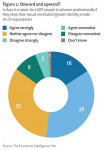Prepare now for the technology-savvy customer of 2013, counsels a new report from the Economist Intelligence Unit
Within five years, mobile, web-based and other information and communications technologies will have empowered customers in their interaction with companies in ways that are only just becoming evident. Business leaders rightly see more opportunity than risk in this development. Gains will accrue in the form of improved customer service and better customer relationships, but it is arguably the innovation process that will benefit most from the higher levels of customer interaction that technology will make possible. In 2013 customers will have supplanted in-house R&D as the primary source of innovative new ideas for their companies.
Companies must begin preparing today for this higher level of customer integration in their business. “This poses a major challenge for IT, but the challenge extends far beyond technology itself,” according to Robin Bew, Editorial Director of the Economist Intelligence Unit. “Firms will need to prepare their entire organisations to manage a much more responsive, customer-focused business.”
These are among the major findings of a wide-ranging programme of research undertaken by the Economist Intelligence Unit, The digital company 2013, which is sponsored by AT&T, Nokia, PricewaterhouseCoopers, SAP, Concep, Habeas and WebEx. The goal of the programme is to determine how technology will impact businesses five years from now. The findings are based on a survey of over 600 senior executives from around the globe, as well as in-depth interviews with business leaders and independent technology experts.
This first paper explores the changes to come in how companies interact with their customers and how they innovate. A subsequent paper will examine in more detail how workplace dynamics and knowledge management will evolve, and what all these developments hold in store for the respective roles of the IT function and the CIO.
Other key findings from this first phase of research include the following:
Online communities will proliferate. Web-based customer communities will play a much greater role than today in gathering·from customers and others·innovative ideas for products and services, and in assisting with product support. Firms will need to be wary of according too much influence to communities, however, lest the latter's suggestions prove unprofitable to implement.
Maintaining the privacy of customers and the security of intellectual property will be paramount. Firms will have access to unprecedented information about their customers. The benefits to the innovation process will need to be balanced against the need to ensure the confidentiality of customers’ personal information. Firms will need to be clear with online communities about the use being made of privileged data. At the same time, business will need to rethink its attitude to intellectual property protection in an era of open collaboration.
Technology will give wings to customisation. Fully 70% of surveyed executives expect their main products or services to be fully or mostly customisable in five years, compared with 40% who say this is the case today. Such levels of customisation will be made possible by, on the one hand, the more sophisticated analysis of customer information, and on the other by the advance of applications and processes that will make it easier to reconfigure and reprogramme products.
Customer interaction will take place far more frequently over mobile devices. Advances in mobile technology will impact more heavily on customer service than any other area of company operation. Mobile devices are unlikely to be the primary channel of customer-supplier communication in 2013, but companies will need to be able to interact with customers much more widely over mobile channels, and using more advanced applications, such as video.
The digital company 2013: How technology will empower the customer is available free of charge at: www.eiu.com/sponsor/Digital2013/
A second report in The digital company 2013 series will be published in September 2008.
웹사이트: http://www.eiu.com
연락처
Edgar Fernandez
Marketing Manager, Asia-Pacific
(852) 2585 3826 이메일 보내기
Fax: (852) 2802 7007
이 보도자료는 Economist Intelligence Unit가(이) 작성해 뉴스와이어 서비스를 통해 배포한 뉴스입니다. 뉴스와이어는 편집 가이드라인을 준수합니다.




